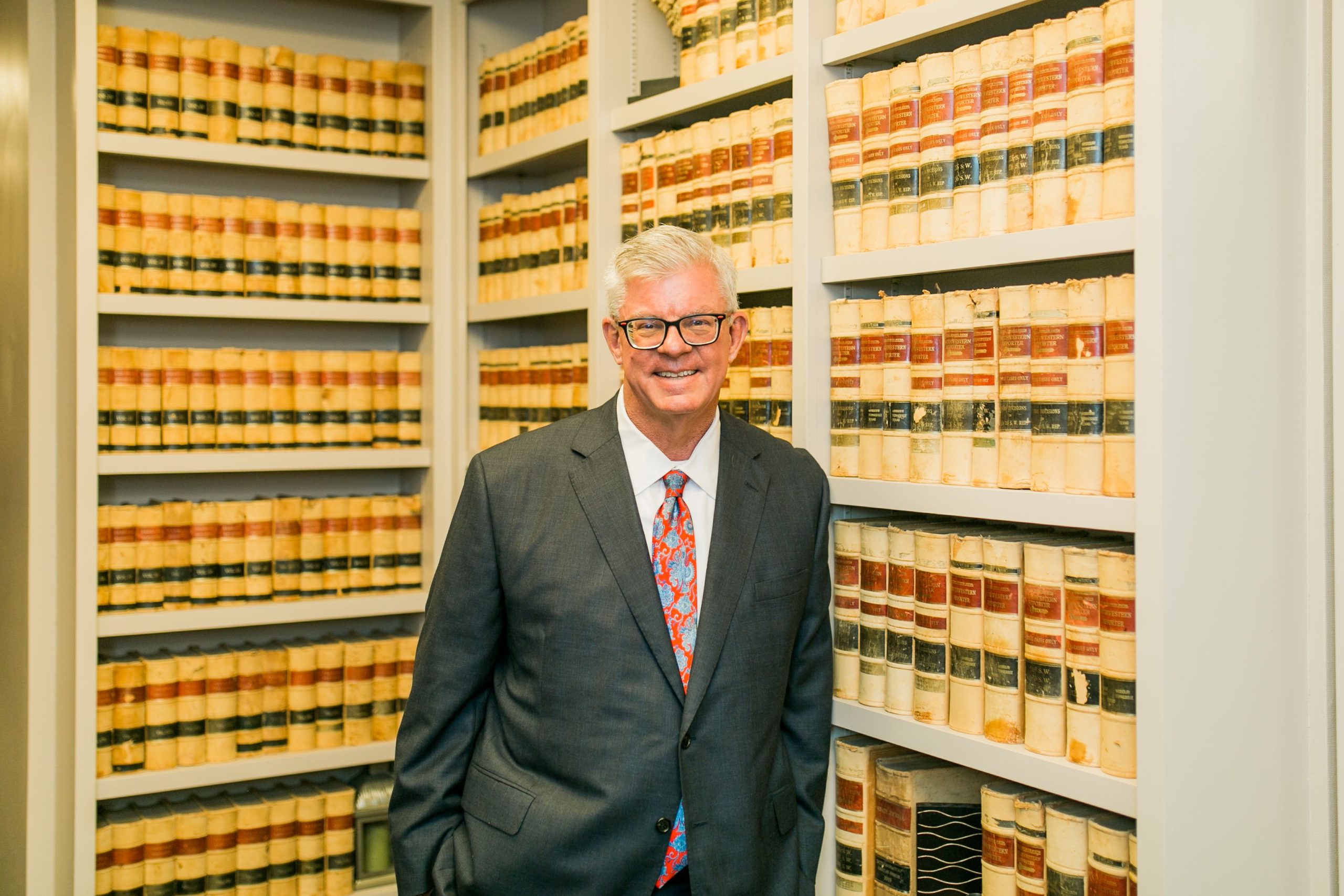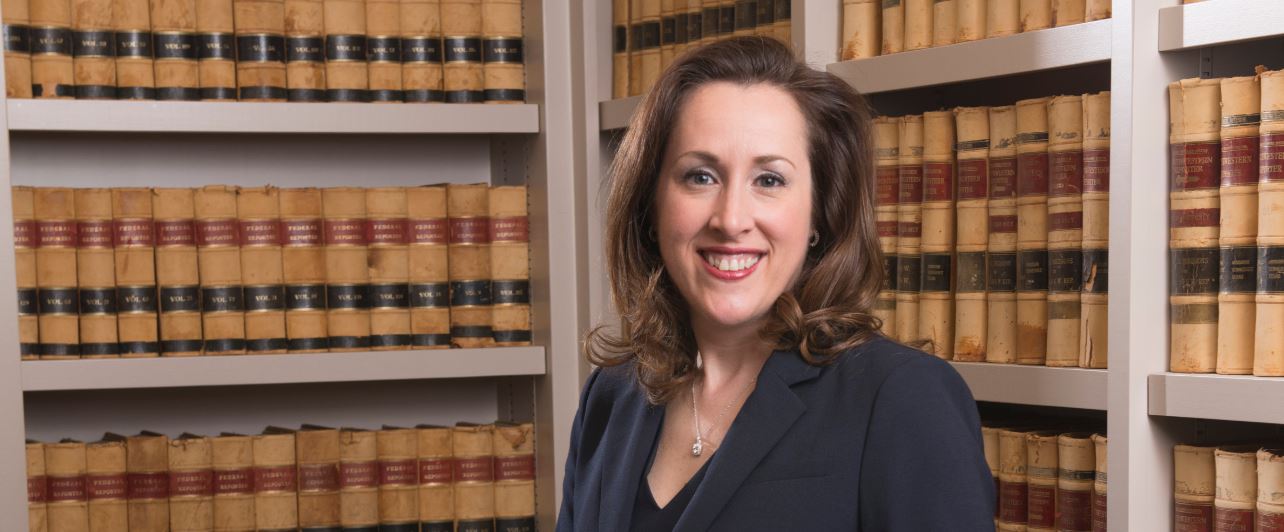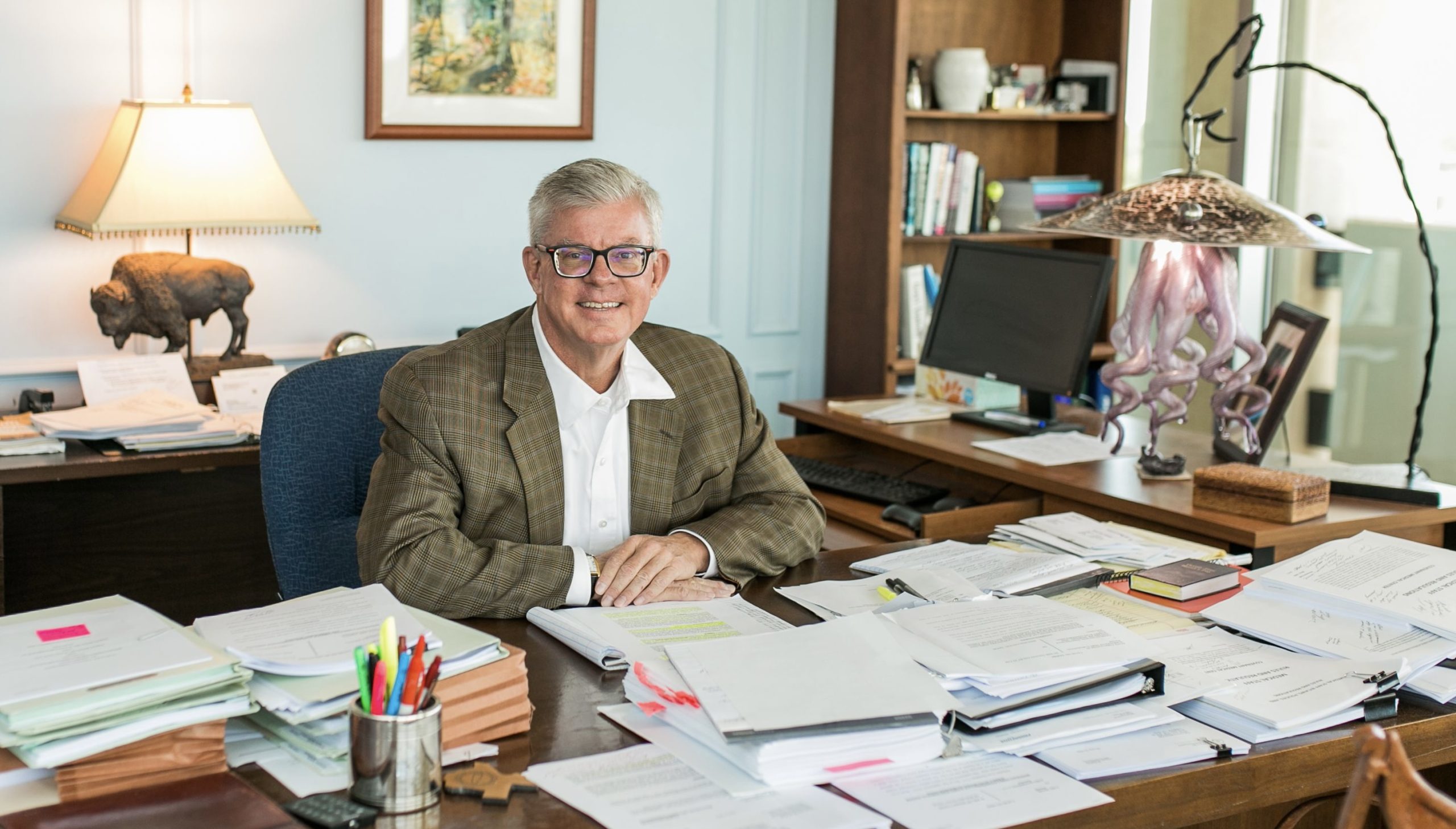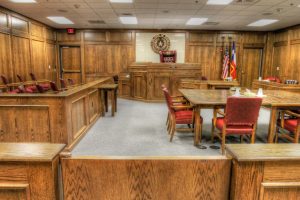This is a companion piece to our recent 95th anniversary story on how McCleskey built its litigation practice.
Building on its impressive history of litigation, Ben Davidson and Ann Stegall are the McCleskey Law Firm’s full-time litigators now, both members of the prestigious American Board Of Trial Attorneys.
Other McCleskey attorneys who do some litigation are Will Griffis, Adam Holmes and Davidson’s daughter, Kathleen.
Davidson and Stegall talked about how they litigate at a time when more people end up settling and avoiding court – but preparation and how they handle a case in court doesn’t change.
Preparing for trial: ‘Command of the facts’
Two separate things happen during trial prep, said Davidson.
“First, you have to know the facts and you have to know them completely – every document, every event, you cannot be hunting for stuff during trial, you can’t be looking up the answers at trial. You have to have command of the facts,” he said.
Like Davidson, Stegall makes sure she’s prepared.
“I like to know my case backwards and forwards and not be digging through papers during the trial. You depose a witness before trial,” she said, adding if in the middle of the trial a witness says something else, she can go to her binder to quickly respond.
“We have awesome support staff who prepare a binder with all depositions and documents and I can flip immediately to it. Preparation is me – and other people – helping me get prepared,” she said.
Trial prep varies with the complexity of the trial, but Stegall said she spends most of the week before a trial getting the case ready and then reviewing it over the weekend. Some of the prep means working with a nervous witness.
“That can be time consuming,” she said, but an important part of the preparation. “One witness saw me coming and started crying. I spent 40 hours with her to calm her down. By the time she was on the witness stand she was excellent.”

Ben Davison
Preparing for trial: What’s the client’s story?
There’s a story to tell, said Davidson.
Maybe your client was too trusting and signed a contract that was legally binding but unfair.
“Very few people say ‘I think I’m going to screw this up for the fun of it,’” he said. “How do we explain that? How do we help a jury see the situation through your client’s eyes? Maybe things didn’t turn out the way other people wanted. Perhaps not the way your client wanted. But given the situation the client was in at that time why was that the right thing to do?”
If the client has some skeletons in their closet, Davidson has to make sure they need to know the other side will bring it up.
So Davidson brings it up.
He used a hypothetical example of a case where a woman had a drug habit because she was in an abusive relationship.
“She has to understand a jury is not going to overlook that she’s a drug addict. So we’ll stand up and admit she has a drug problem because we’re not going to let the other side bring it up,” he said.
Even if an attorney doesn’t have the best story to tell but the client wants to go to trial, the attorney’s job is to be their advocate.
“You can’t let you own self-image get in the way of taking care of your client. If you’re only going to try the slam dunks, you’re not going to try a lot of cases,” he said.
Go, or not go, to trial?
More cases are settled before trial because of uncertainty. But some people want their day in court, said Davidson.
“I’ve tried some terrible cases where the insurance company says this is all they’re going to pay and the client says no, that’s not enough. There can be things that force you to trial. It might be in a family law situation where there the parties are so emotionally entrenched they have to have their day in court,” he said.
“That’s what you give them. At the end there’s a finality because they got to tell their story in front of 12 citizens of Texas,” he said.
Stegall added if someone says they know what a jury will do, they’re lying.
When she started practicing law in Dallas, they did a mock trial with people from a temporary employment service as jurors.
“A number of us new attorneys tried the same case in two different trials with two different juries. The juries discussed different things and had radically different results. You never know what a jury will do,” she said.
‘It’s a great system’
McCleskey’s attorneys respect the jury system.
“I’ve lost a slam dunk I thought I was going to win and I’ve won cases I thought I was going to lose,” said Davidson. “That’s the nature of the jury system.”
Jurors have a collective wisdom, he said.
“They pick things up and generally as they work toward consensus, they have a wisdom that many times is beyond that of the parties. They do take in the entire context. It’s almost like they have a god-like view,” he said.
But the uncertainty of what that collective wisdom can come up with is frightening.
“A lot of people don’t like it, but I accept it. It’s a great system and I’m a firm believer in it,” he said.
Most people don’t want to serve as jurors for many reasons. But once they’re picked to sit on a jury, they take it seriously.
“They appreciate that they’re making decisions that are going to affect people’s lives,” he said. “When you sit down and think about it, the jurors did justice. That’s our system at work.”

Real life in court isn’t like TV
Even in the heat of battle during a trial, Stegall said the experience is nothing like TV shows.
“Maybe it’s just cases I’ve tried, but you don’t see stuff like you see on TV – people screaming. Judges and attorneys are civil with each other, judges won’t let a screaming match happen. It’s not like ‘Law and Order’ where people are hostile or vulgar with each other,” she said.
Davidson agreed.
“The yelling and screaming, the high antics and we’re done in 60 minutes. That’s not true,” he added.
“But by and large, we are professionals and we act like professionals. Now, I am certainly not adverse to a little incidental contact after the whistle. But we’re not over the top and the judges are there to make sure we’re not. A trial is conducted in an appropriate manner, befitting the seriousness of what is happening.”
Good lawyers work to make sure their cases go as quickly as possible, but it still takes time to present that case, he added.
“There are there are periods of tedium where you’re laying background, where you’re struggling with a witness where you’re putting in 14 documents to show what the parties were dealing with as they went along,” he said.
There are moments of humor, drama and tension, said Davidson.
“But they are unfortunately separated by lot of pedestrian stuff – when you’re describing the context. Then there’s this point where the volcano explodes. It’s terribly exciting, but there’s all this stuff around it. That has to be brought into the picture so we’re dealing with explanation and persuasion. My job is to make you understand what happened and my client’s role in it from my client’s perspective,” he said.
Then there are the curveballs, said Stegall.
“In every case you try you get a curveball. A judge won’t let you bring something up and won’t let you talk about something a witness brings up. Or the other side brings up something or a witness. While you do your absolute best to prepare for every eventuality, in every jury trial something spontaneous happens and you have to do something on the fly. It’s essential to think quickly on your feet and your support staff is extremely important. You have to listen to the judge while a paralegal or supporting attorney is telling me what I need to know so I can focus on what the witness or judge is saying,” she said.
ABOTA
A few years ago, Stegall became the first female attorney from Lubbock and the South Plains to be inducted into the American Board of Trial Advocates.
“This is Ann’s latest step in the string of successes she has achieved during her legal career. Some of the very best trial lawyers in Lubbock wanted her in this organization. They’ve been up against her as adversaries and worked with her as co-counsel. They appreciate her talents and know she is a quality person,” said Davidson, also an ABOTA member.
Character is as important to ABOTA as skill, he added.
“The American Board of Trial Advocates is one of the most prestigious legal organizations in this country. It is dedicated to preserving our right to trial by jury in civil cases as enshrined in the Seventh Amendment to the United States Constitution. You can’t get in unless your peers recognize your talent in the courtroom and the quality of your character. As we say, ‘There are no jerks in ABOTA,’” said Davidson.
Being part of ABOTA, Stegall said, helps her be a better advocate for her clients.
“When you surround yourself with people who are great at what you do it only makes you better. When you talk to an attorney who has tried 20 cases and watch them in trial, watch voir dire, opening and closing arguments and help them prep – it changes how you do it. You learn how you can improve. That’s what these attorneys are doing – how to improve their process, jury system and how people understand jury system,” she said.
To be invited into ABOTA is not simple. A litigator must have tried a minimum of ten trials and go through a detailed vetting process.
And it’s harder to get to ten trials when more cases are settled.
“Things went to trial much more often 20 to 30 years ago,” she said.



